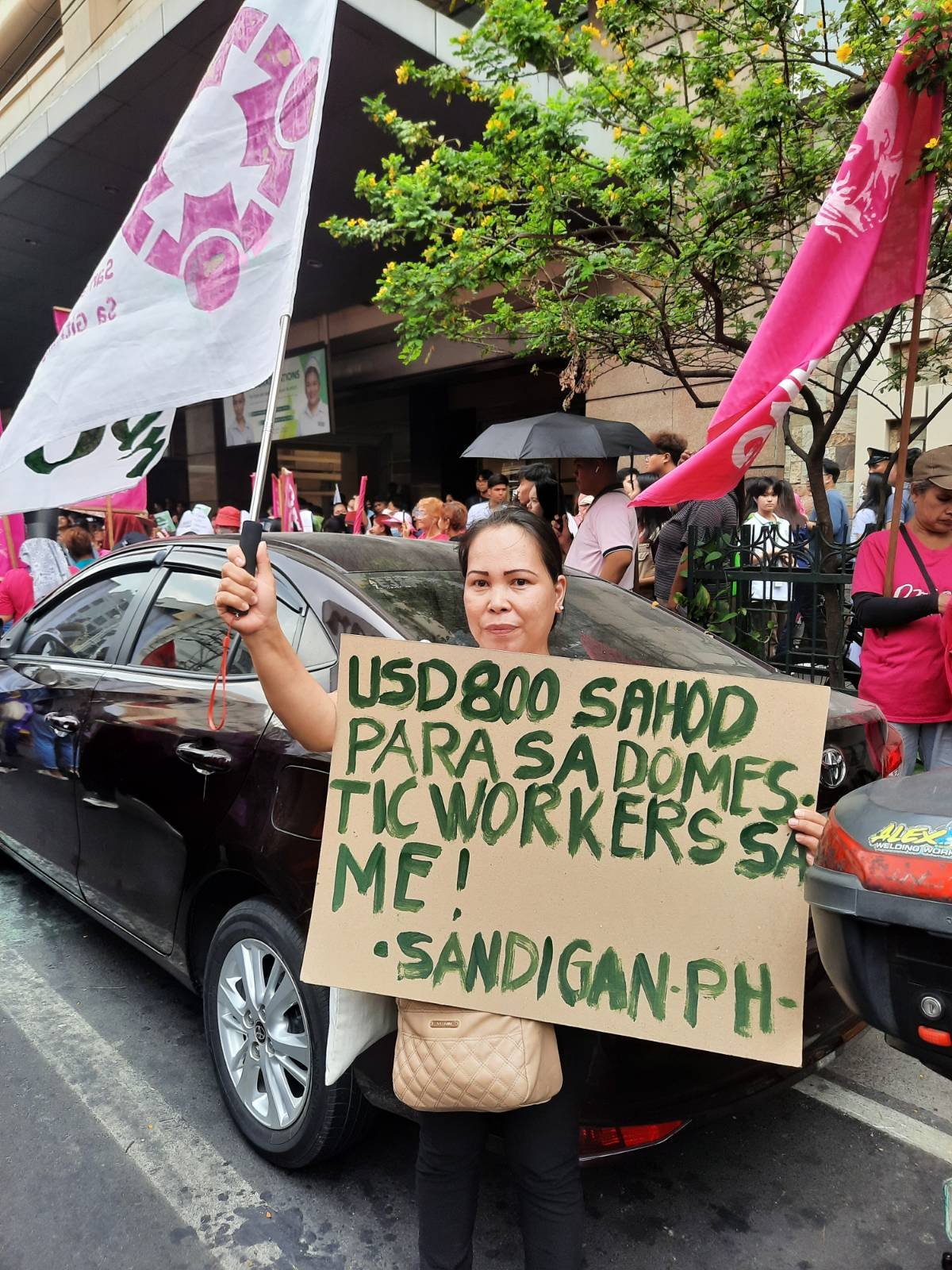Filipino Women Migrants in the Middle East: Stories of Struggle and Collective Empowerment
Rechilda Desunia, Vice-Chairperson of SANDIGAN.
March 8, 2024 - International Working Women’s Celebration in the Philippines.
In the landscape of international labor migration, the Middle East emerges as a crucible of both opportunity and adversity, particularly for women migrant workers in the Philippines. Against this backdrop, the experiences shared by APMM’s interview with Rechilda Desunia, Vice-Chairperson of SANDIGAN (Samahan ng mga Domestic Helpers sa Gitnang Silangan), uncovers the multifaceted challenges encountered by Filipino female domestic helpers in the region and highlights the collective empowerment initiatives undertaken by grassroots women migrants.
Domestic helpers in the Middle East confront a myriad of hardships from their employers, agencies, and different governmental agencies. Rechilda recounts the painful experience of fellow domestic helpers who suffer from insufficient food provision, only eating little leftover food for only once a day. She also shares the day-to-day overworked situation starting from 5:00 AM to 1:00 AM at midnight, only being able to rest for four hours and during an eating break for only fifteen minutes. With an employer who has 5-10 family members with various demands and instructions, they are not allowed to sit down and would suffer from different verbal scoldings if they did. These are just some accounts of the modern-day slave-like experiences of many migrant women in the Middle East.
At the same time, recruitment agencies worsen their plight by neglecting domestic workers’ grievances and coercing them into accepting unfavorable settlements. Agencies often ignore complaints or deliberately reply late to the concerns sent to them by the migrants. They refuse to coordinate with migrant workers, especially with advocacy groups like SANDIGAN. Responsible Philippine government agencies also exhibit incompetence and tokenistic efforts in resolving these problems. Rechilda shares how troubled overseas Filipino workers (OFWs) who go home are greeted by their negligent agencies and are lured to go to the office of Overseas Workers Welfare Administration (OWWA), an attached agency of the Department of Migrant Workers (DMW), for quitclaims worth PHP 75,000 in paper. In actuality however, repatriated migrants only receive about PHP 5,000-10,000. When a migrant worker signs a quitclaim, they waive all their rights to dispute or file a complaint against their employer.
Despite these adversities, women migrant workers and advocates continue to navigate these hardships with courage and collective action. SANDIGAN’s initiatives underscore the importance of empowering women to assert their rights and resist exploitative practices. Through initiatives such as “Know your Rights” orientations and the establishment of local chapters that offer different kinds of support such as counseling and disaster-support programs, women migrants become more equipped with knowledge and tools to fight for themselves and one another.
Central to SANDIGAN’s advocacy is the reiteration of a fundamental principle: domestic workers are not slaves; they are workers deserving of dignity and fair treatment. Rechilda’s accounts of the Filipino woman migrant worker’s plight emphasize the urgent need for policymakers, employers, and society at large to recognize grassroots migrants as primary stakeholders in solving migrant issues. As we become enraged by the aforementioned narratives of migrant women’s exploitation and dehumanization, we must demand fair wages, decent working conditions, and avenues for recourse and justice in cases of exploitation or abuse. Rechilda challenges the Philippine government to prioritize the creation of decent jobs with livable wages for the Filipino people, thereby ending the forced labor exportation cycle.
During this Working Women’s Month, SANDIGAN and Rechilda urge fellow women to radiate with pride in three key aspects: their capabilities, wealth of knowledge, and exhibited skills. Migrant women’s sacrifices, militance, and collective actions are not to be belittled, but rather celebrated and embraced with pride! Let us stand together, recognizing the strength and resilience inherent in every migrant woman's journey, as we continue to advocate for their rights and dignity.
This article is part of APMM’s effort to feature courageous women and their respective organizations through a series that aims to foster stronger solidarities among migrant women, migrant organizations, the migrant movement, and other civil society organizations that will continue to support the struggle of women involved in migration.

